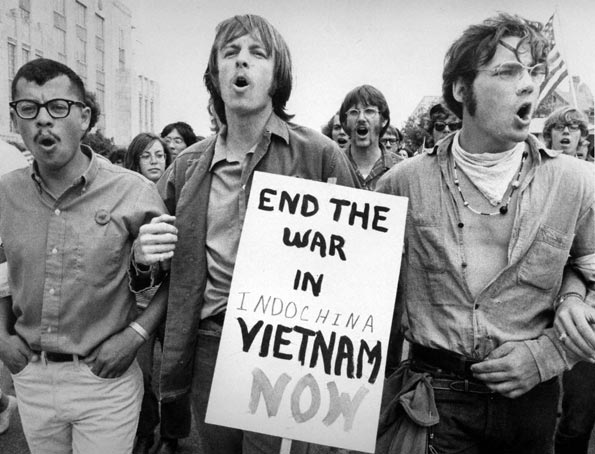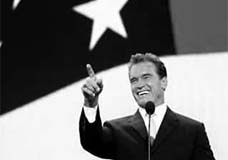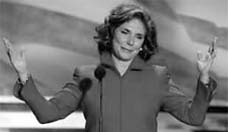
Belknap said there were other ways of evading the draft including joining the Peace Corps - a course taken by 15,000 young people a year during the Vietnam War - or volunteering for the National Guard and reserve
How the draft defined a generation
By LANCE GAY
Scripps Howard News Service
September 15, 2004
WASHINGTON - For baby boomers, growing up in 1960s America meant mandatory ROTC drills on college campuses, black-and-white TV, high and tight haircuts and scheming to avoid being sent to Vietnam.
George Bush picked the National Guard. It sounds risky today when the Pentagon relies on the National Guard and reserves for combat support roles in Afghanistan and Iraq. But that wasn't the way most viewed it in the 1960s.
Dick Cheney said he had "other priorities" at the time and got five deferments that prevented him from being drafted. John Kerry volunteered for the Navy, which looked like a safer billet until the admirals embraced a more aggressive strategy of sending small boats to hunt down Viet Cong guerillas in the Mekong Delta. John Edwards was never eligible for the draft - it ended in 1973 when he was still in college. And young Ralph Nader completed his military service as an Army cook after graduating from law school in 1958.
For many young Americans heading to the polls Nov. 2, the political fights over who served and who got military deferments - and why they got the deferments - are a mystery. But for older generations, dealing with the draft board and looking at two years of military service was once a part of the way Americans ended their teenage years.
James Reckner, director of the Center for the Study of the Vietnam Conflict and a history professor at Texas Technical University in Lubbock, said the political fights reflect a legacy of bitterness seared into America's psyche by Vietnam.
"I've convinced myself we are going to be fighting about this when we're all in rest homes and going at each other with canes in our wheel chairs - it's one of those gut issues," said Reckner.
The feelings are doubly bitter for Vietnam War fighters like himself who returned home branded baby killers and disparaged for doing what their country ordered. Reckner said Kerry's efforts to appeal to voters both as a hero of the Vietnam War and as a leader of Vietnam Veterans Against the War has only reopened old wounds Reckner wishes he could bury.
For the children of wealth and prestige, there were avenues to escape being called up for Vietnam and it's been a recurring issue in previous campaigns. Bill Clinton was forced to explain in 1992 how he avoided the draft by enrolling in Oxford University as a Rhodes scholar. Dan Quayle became embroiled in a controversy in the 1988 campaign over how he got into the Indiana National Guard.
Joining the National Guard was one way of avoiding Vietnam, and that ominous letter that began: "Greetings. Your friends and neighbors have chosen you... ."
Throughout his presidency, Lyndon Johnson sought to minimize the Vietnam War, referring to it as a "conflict." But as the Pentagon called for more troops to fight the police action in South Vietnam, Johnson avoided activating the National Guard or reserves because that meant sending off to war the teachers, policemen, firemen and lawyers who were the bedrock of communities across the country.
The draft provided the manpower to fight World War II and had the advantage for Johnson of drawing from across the country rather than individual states. The National Guard Association of the United States notes some Army and Air Force guard units were sent to Vietnam in 1968 - the year George Bush joined the service - and some members of the National Guard were killed in the fighting there.
While the draft provided the manpower for World War II and the Korean War, it wasn't a system that worked well with deeply unpopular wars. The Pentagon restructured the system in 1973, creating an all-volunteer force with combat support provided by the National Guard and Reserves, and a standby draft.
Timothy Lomperis, chairman of the political science department at St. Louis University who has written three books on the Vietnam War, believes the unfairness of the Vietnam draft system broke apart the national consensus left after World War II.
"We're a totally destroyed generation," Lomperis said. "We will go to our graves clawing at each others throats over this. It was just a huge collision in values."
Lomperis said bitterness left from the war cost him youthful friends who opposed the war and still won't speak to him today because he served in Vietnam. Lomperis said the fights have soaked into the structures of modern college campuses, where one of the little-noticed legacies from Vietnam draft fights was a corps of professors who chose to stay in school for their doctorates so they could continue to get draft deferments.
The Selective Service system says that if the draft is ever brought back, deferments will be allowed only for a semester. But when the Vietnam War started, college students could defer being called up for the draft as long as they got satisfactory grades and their college education continued.
Under the revamped system, America's children in the future face the possibility of being drafted in only the one year when they are 20 years old. In the Vietnam era, the possibility of being drafted applied to men between the ages of 18 and 35 years of age.
Historians say that in practice, the Pentagon seldom drafted those over 26, and exemptions were provided for fathers of children and for a few selected professions, such as physicists. Others found sympathetic doctors and applied for a 4-F exemption on the grounds they were physically or mentally unfit. Homosexuality was also cause for exemption, but that was seldom used because of the sigma it carried in American society at the time.
Of the 27 million males who reached 18 between the years 1964 and 1972, 2.2 million were drafted, and 8.7 million volunteered for military service. About 16 million escaped the military draft entirely, including more than 209,000 men listed officially as draft dodgers, many of whom went to Canada. More than 3,000 were imprisoned for dodging the Vietnam draft.
"It was comparatively easy to stay out of combatant military service," recalled Michal Belknap, a historian and law professor at San Diego's California Western School of Law.
Belknap said avoiding the draft resulted in creating an anti-draft bar of young attorneys who devised ways of battling the decisions of local draft boards through the courts.
Belknap said there were other ways of evading the draft including joining the Peace Corps - a course taken by 15,000 young people a year during the Vietnam War - or volunteering for the National Guard and reserves.
"Everyone in my age knew what the reserves and National Guard did, and they could stay out of the Army that way," he said.
(Contact Lance Gay at GayL(at)SHNS.com. Distributed by Scripps Howard News Service, http://www.shns.com)



